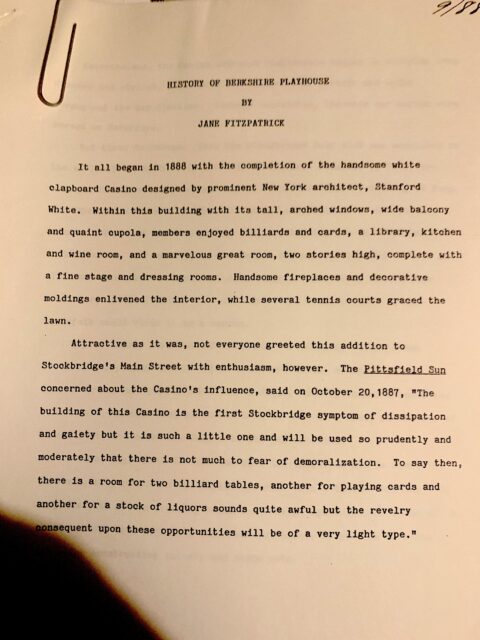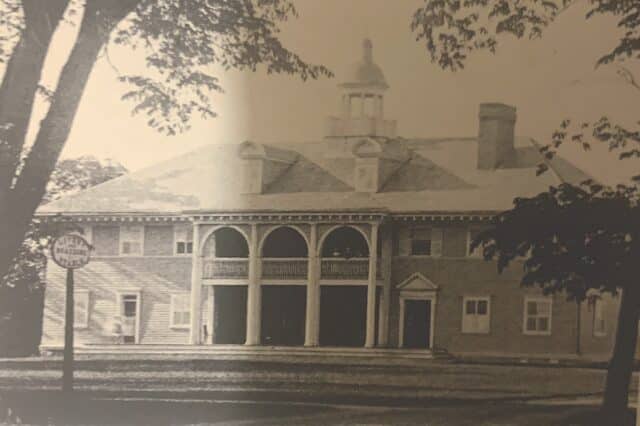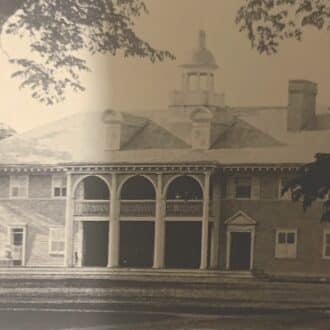By: Katie Birenboim
One of the highlights of looking back into the BTG archives in advance of our centennial is getting to see not only original artifacts/documents/photos from the theatre’s history, but also how various people associated with the theatre have characterized and described it. A prime example is an essay about the theatre, and its history, which I found during my last trip to the archive room and which was written by none other than the late, great Jane Fitzpatrick (for which the Playhouse stage is currently named) in 1988.
Friends of BTG will recall Fitzpatrick’s storied history with our theatre and with the Berkshires community more broadly: along with her husband, Jack, Fitzpatrick founded Country Curtains in 1956, which grew to include 24 retail stores, 600 employees, and an 110,000 square-foot warehouse on Route 102 in its heyday. She also purchased the Red Lion Inn, and saved it from potential demolition, in 1968. Most importantly, for our sake, Fitzpatrick is remembered for her exceptional contributions to Berkshire Theatre Group, including a 23-year stint as President of the Board of Trustees. In fact, Fitzpatrick headed the “Save the Playhouse” movement in 1975 – largely responsible for, as the name implies, “saving” the theatre during one of its more tumultuous periods. I never had the pleasure of knowing her personally, but I have long heard about her “go-to-it” attitude, generous spirit, and unmeasurable contributions to the theatre and the greater Berkshires cultural landscape from Kate Maguire and others.
You can see all of these qualities in Fitzpatrick’s essay, likely written in honor of the 100th anniversary of the Casino (you’ll see, in reading her essay, why this date is separate from the upcoming anniversary of the building’s history as a “fine, legitimate theatre”). Fitzpatrick’s attention to detail and her knowledge of, and fascination with, history and the Berkshires “local color” is on full display: she notes details like the fact that, in the early, Casino days, “anchovy sandwiches, lemonade, and coffee” were served on Saturdays, and that there was some fear about the Casino’s potential to “demoralize…” the public. In fact, she quotes an 1887 article in The Pittsfield Sun that sounds as if it’s been lifted directly from The Music Man (“Friend, either you’re closing your eyes/To a situation you do not wish to acknowledge/Or you are not aware of the caliber of disaster indicated/By the presence of a pool table in your community” can be compared to “The building of this Casino is the first Stockbridge symptom of dissipation and gaiety but it is such a little one and will be used so prudently and moderately that there is not much to fear of demoralization.”).
She talks about the committee, made up of prominent financiers, artists, and doctors like Walter Clark, Frank Crowninshield, Walter Pritchard Eaton, Daniel Chester French, and Austen Riggs, who ultimately “saved” the Casino in 1928, and the many famous actors who have since appeared on its stage, like Katherine Hepburn, James Cagney, Thornton Wilder, Anne Bancroft, Gloria Swanson, Al Pacino, Gene Hackman, Dustin Hoffman, and Sigourney Weaver, as well as the directors and administrators who have led it, like F. Cowles Strickland, Alexander Kirkland, Billy Miles, Arthur Penn, and William Gibson. I hope to explore many of these important figures in BTG – and broader theatrical – history in future blog posts. But most importantly, evidenced throughout the essay is Fitzpatrick’s obvious love and care for the theatre, and everything for which it stands. I hope you enjoy reading her essay as much as I enjoyed discovering it!

History of Berkshire Playhouse
By Jane Fitzpatrick
It all began in 1888 with the completion of the handsome white clapboard Casino designed by prominent New York architect, Stanford White. Within this building with its tall, arched windows, wide balcony, and quaint cupola, members enjoyed billiards and cards, a library, kitchen and wine room, and a marvelous great room, two stories high, complete with a fine stage and dressing rooms. Handsome fireplaces and decorative moldings enlivened the interior, while several tennis courts graced the lawn.
Attractive as it was, not everyone greeted this addition to Stockbridge’s Main Street with enthusiasm, however. The Pittsfield Sun, concerned about the Casino’s influence, said on October 20, 1887, “The building of this Casino is the first Stockbridge symptom of dissipation and gaiety but it is such a little one and will be used so prudently and moderately that there is not much to fear of demoralization. To say then there is a room for two billiard tables, another for playing cards and another for a stock of liquors sounds quite awful but the revelry consequent upon these opportunities will be of a very light type.” Nevertheless, the Casino welcomed fashionable ladies in sweeping long dresses and stylish, broad hats for theatricals, parties, and balls throughout the Gay Nineties. Anchovy sandwiches, lemonade, and coffee were served on Saturdays.
But times do change. When the Stockbridge Golf Club was completed in the early 1900s, membership started to decline. Finally, by 1925, the once gay Casino stood quiet and empty. There was talk of tearing it down.
When Mable Choate, daughter of one of the founders of the Casino, purchased the land and building in 1926 for $2,000, her interest was not in the Casino. It was only in the land. She was determined to move the 1739 home “Old Mission House” of John Sargaent, the first Stockbridge missionary to the *Indians, to a site where she could restore it and townsfolk could visit it as a museum.
Walter Clark, a partner of financier J.P. Morgan, editor Frank Crowninshield, drama critic Walter Pritchard Eaton, sculptor Daniel Chester French, and psychiatrist Austen Riggs, hastily formed a committee to save the Casino. They purchased land on Yale Hill Road, at the end of Main Street, and moved the Casino to its new location.
A fine, legitimate theatre was what the committee had in mind. To this end, they remodeled the Casino interior into a theatre seating 450, complete with modern dressing rooms and storage space for scenery. A large barn on five adjoining acres was purchased, to provide workshop space for constructing scenery and stage sets.
Finally, in 1928, the Berkshire Playhouse opened its doors with a flourish! Headlining their first play was Eva Le Gallienne in The Cradle Song. Excitement was boundless as over 30 elegant limousines rolled up to deposit their occupants at the distinguished new theatre.
From that time on, success followed success. A fresh young actor by the name of Alexander Kirkland and equally young director with minimal experience F. Cowles Strickland, teamed up to oversee activities at the theatre. With boundless enthusiasm, they brought stellar entertainment to Stockbridge.
James Cagney starred in Oh Boy, the first musical attempted by the Playhouse in 1929. In 1930 Katherine Hepburn and Jane Wyatt apprenticed at the Playhouse Drama School, a fledgling school for aspiring actors and actresses. Hepburn performed bit parts in The Romantic Young Lady. Succeeding years saw star performers such as Ethel Barrymore, Claude Rains, Montgomery Clift, Betty Field, and Katherine Hepburn, now a full fledged star, make their mark at the Playhouse.
In 1935 Billy Miles came to the Playhouse to direct the first of his twenty-three seasons. Under his guidance, Jane Wyatt, back as a star, appeared in Stage Door in 1938 and Thornton Wilder starred in his own production of Our Town in 1939. Lillian Gish, Leo Carroll, Ruth Gordon, and Vivian Vance all starred in productions, as well. There was never a shortage of stars or exciting performances in Stockbridge during the Miles years.
Billy Miles had tried to retire in 1953 but had been called back. For a while, he served as advisor to a succession of new directors, but the theatre waned. Nevertheless, in 1961, Gloria Swanson thrilled audiences in Between Seasons. Anne Bancroft, Eli Wallach, Christopher Plummer, Al Pacino, Eva Marie Saint, Gene Hackman, Estelle Parsons, Dick Cavett, and Shelly Winters are only a few of the stars who performed during the ensuing years.
In 1965 the Berkshire Theatre Festival was formed by a group of New York theatre professionals. They purchased the Playhouse and a new era began. Finally, in 1967, the new team of William Gibson and Arthur Penn took over the reins.
Throughout the 1970s and 1980s, the Berkshire Theatre Festival continued to attract the nation’s leading stars. Dustin Hoffman, Joanne Woodward, Daniel Travanti, Kim Hunter, and Sigourney Weaver all brought vitality to the Playhouse stage.
In 1988, the Berkshire Playhouse celebrated its 60th season. At the same time, the venerable Stanford White building, now on the National Register of Historic Places and a member of the League of Historic American Theatres, celebrated its 100th anniversary. The Unicorn Theatre, where apprentices perform experimental productions, now occupies the barn, while a thriving children’s theatre, performing plays written by Stockbridge students, takes place under a tent in the yard. During the celebrated anniversary year, Julie Harries starred in the world premiere of Tusitala, on the Main Stage and world famous dancer, Marge Champion, directed the musical Stepping Out to record audiences.
*We recognize that this wording is not respectful of the members of The Stockbridge-Munsee Band of the Mohican Indians whose land the events outlined in this essay occurred on, and on which the Mainstage currently resides. Rather than re-write the original content, we want to acknowledge the harm and honor the full humanity and rich culture of the Stockbridge-Munsee band of the Mohican Indians. To learn more please visit https://www.mohican.com/
Additional sources:


